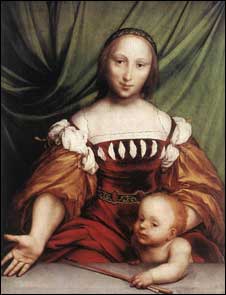|
|
|
|

Hans Holbein, the Younger. Venus and Amor. 1525.
"Though that men do call it dotage"
by King Henry VIII
FROM Brit. Lib. Additional Ms. 31922
Though that men do call it dotage,
Who loveth not wanteth courage;
And whosoever may love get,
From Venus sure he must it fet,
Or else from her which is her heir,
And she to him must seem most fair.
With eye and mind doth both agree.
There is no boot: there must it be.
The eye doth look and represent,
But mind afformeth with full consent.
Thus am I fixed without grudge:
Mine eye with heart doth me so judge.
Love maintaineth all noble courage.
Who love disdaineth is all of the village:
Such lovers—though they take pain—
It were pity they should obtain,
For often times where they do sue
They hinder lovers that would be true.
For whoso loveth should love but once.
Change whoso will, I will be none.
|
Source:
Music & Poetry in the Early Tudor Court.
John Stevens, Ed.
London: Methuen, 1961. 406-7.
 |
Sheet Music for "Though that men do call it dotage" (Original Manuscript, c.1518)
|
 |
Sheet Music for "Though that men do call it dotage" (Modern)
|
 | to Works of Henry VIII |
Site copyright ©1996-2025 Anniina Jokinen. All Rights Reserved.
Created by Anniina Jokinen on January 20, 2007. Last updated March 30, 2025.
|
|
The Tudors
The Parents of Henry VIII
King Henry VII
Elizabeth of York
The Six Wives of Henry VIII
Queen Catherine of Aragon
Queen Anne Boleyn
Queen Jane Seymour
Queen Anne of Cleves
Queen Catherine Howard
Queen Katherine Parr
The Children of Henry VIII
Henry Fitzroy, Duke of Richmond
King Edward VI
Queen Mary I
Queen Elizabeth I
The King's Advisors
Cardinal Thomas Wolsey
Archbishop Thomas Cranmer
Thomas Cromwell
Sir Thomas More
European Monarchs
Margaret Tudor, Queen of Scotland
James IV, King of Scotland
James V, King of Scotland
Mary of Guise, Queen of Scotland
Mary Tudor, Queen of France
Louis XII, King of France
Francis I, King of France
Ferdinand II, King of Aragon
Maximilian I, Holy Roman Emperor
Charles V, Holy Roman Emperor
Popes
Pope Julius II
Pope Leo X
Pope Clement VII
Pope Paul III
English Nobility
Charles Brandon, Duke of Suffolk
Edward Stafford, D. of Buckingham
Thomas Howard, 3rd D. of Norfolk
John Dudley, D. of Northumberland
Thomas Boleyn, Earl of Wiltshire
George Boleyn, Viscount Rochford
John Russell, Earl of Bedford
Thomas, Lord Audley
Richard de la Pole
Thomas Seymour, Lord Admiral
Edward Seymour, Protector Somerset
Clergy
Cardinal Lorenzo Campeggio
Cardinal Reginald Pole
Bishop Stephen Gardiner
Edmund Bonner, Bishop of London
Nicholas Ridley, Bishop of London
John Hooper, Bishop of Gloucester
John Aylmer, Bishop of London
John Fisher, Bishop of Rochester
Archbishop William Warham
Richard Fox, Bishop of Winchester
Edward Fox, Bishop of Hereford
William Tyndale
Hugh Latimer
William Grocyn
Thomas Linacre
Historical Events
The Battle of the Spurs, 1513
Field of the Cloth of Gold, 1520
Dissolution of Monasteries, 1536-40
Pilgrimage of Grace, 1536
The Siege of Boulogne, 1544
The Sweating Sickness
Tudor Legal System
Common Law
Court of Common Pleas
Court of King's Bench
Court of Star Chamber
Council of the North
Attainder
Oath of Supremacy
The Act of Supremacy, 1534
The Act of Succession, 1534
The Ten Articles, 1536
The Six Articles, 1539
Royal Residences
Greenwich Palace
Hatfield House
Richmond Palace
Windsor Palace
Tudor Literature
See section
16th-century Renaissance English Literature
More at Encyclopedia
|
|